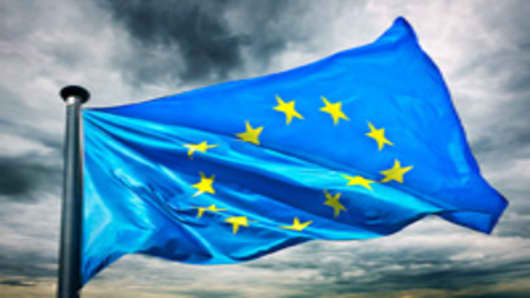With stocks in Asia dropping to near their 2012 lows and investors fleeing risk assets on growing worries about Europe’s debt crisis, several market watchers say it’s time for Europe’s central bank to step up bond purchases and ease monetary policy further.
“Ultimately everything is euro-centric and the deafening silence from the European Union and the ECB has surprised me,” Patrick Perret-Green, Head of Asia Forex & Rates Strategy at Citi told CNBC. “I believe that we are at a point where they (ECB) need to be proactive rather than reactive.”
The ECBneeds to step in to buy Spanish and Italian bonds, and the European Stability Mechanism should be activated now, Perret-Green said. They should also make clear their commitment to back European banks, he added.
Investor jitters were heightened after Spain's borrowing costs shot up at a bond auction on Thursday and Moody’s cut credit ratings on 16 Spanish lenders.
Japan’s Nikkei-225 Index, South Korea’s Kospi, Taiwan’s Taiex and Australia’s S&P/ASX 200 closed down between 2.6 percent and 3.4 percent on Friday. The selling was broad-based with the Korean won weakening by one percent against the U.S. dollar at one point.
Anita Yadav, Managing Partner at SJ Seymour, a corporate bond brokerage in Singapore, said investors were fleeing risk in the credit markets as well, avoiding even investment-grade names and pushing the yield on the 10-year Japanese Government Bond to 0.82 percent, the lowest since 2003.
Leaders of the Group of Eight nations will be gathering at Camp David this weekend but analysts say the G8 is unlikely to come up with any major steps and the focus will remain on the ECB and its President Mario Draghi.
“Draghi holds the cards,” David Kotok, chief investment officer at Cumberland Advisors told CNBC. “Not the finance ministers. The only game in town is the ECB.”
Unlike the Federal Reserve, which has cut rates to zero percent, the ECB has kept interest rates at 1 percent. The ECB hasn't bought government bonds in large amounts as the Fed did with its quantitative easing (QE) programs though it has provided the banking system with two rounds of liquidity via the long-term refinancing operation (LTRO).
Draghi's predecessor, Jean-Claude Trichet, meanwhile, has suggested a radical plan to save the Euro, which would shift the onus away from the central bank and on to politicians. According to Reuters, the plan would give European leaders the power to declare a sovereign state bankrupt and take over its fiscal policy.
“The bottom-line is Europe needs to slow up on the austerity front and ease up on the monetary front,” Shane Oliver, Head of Investment Strategy and Chief Economist, AMP Capital Investors in Sydney told CNBC Asia’s “Cash Flow”. “If they did that, then it would make it a lot easier for Europe to go through this adjustment, much like what America is doing.”
“America has been going through a healing process but the Fed made that very easy,” he added. “They kept the patient alive, while Europe looks at risk of dying if they don’t do anything.”
By CNBC’s Sri Jegarajah and Jean Chua.


